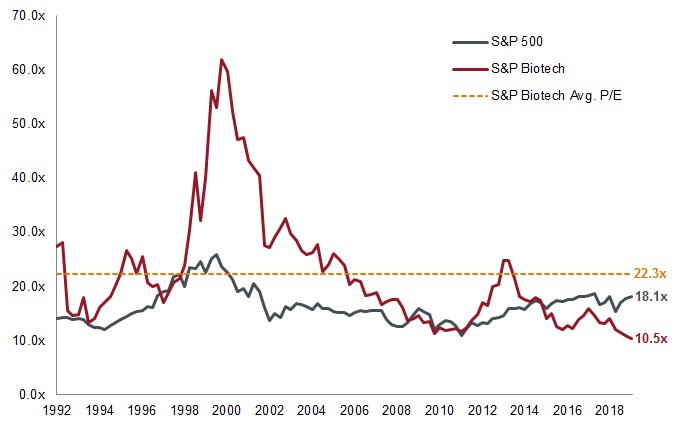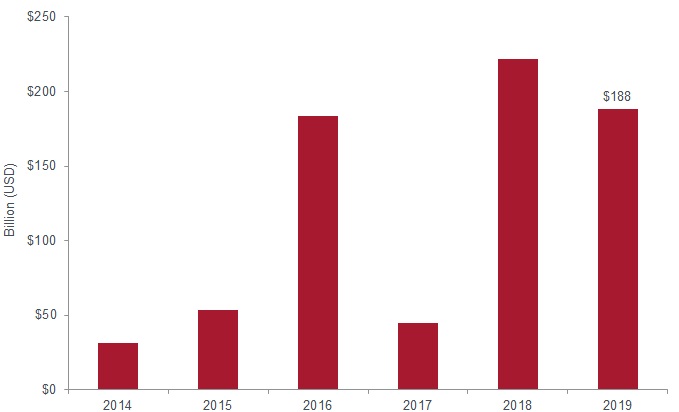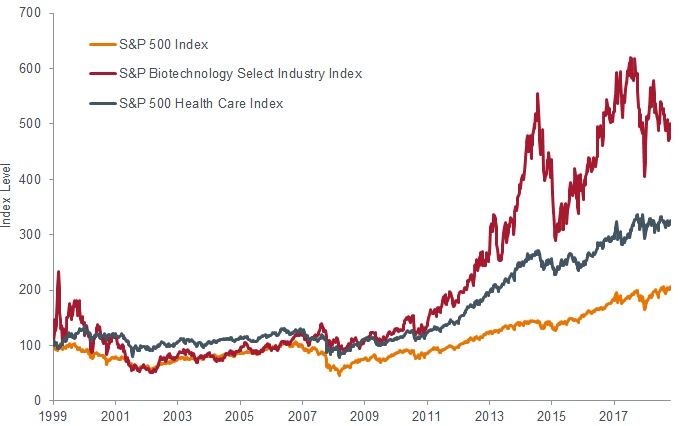Subscribe
Sign up for timely perspectives delivered to your inbox.
Biotechnology stocks have been suffering a decline for some months. But while the sector faces some challenges, attractive valuations and a rapid pace of medical innovation could become difficult for investors to ignore, says Portfolio Manager Andy Acker.
Biotechnology is known for periods of volatility, with this year being a prime example. After rising 30% this year to 5 April 2019, the S&P Biotechnology Select Industry Index began a decline over several months, falling by as much as 20% in October.1 The sell-off occurred as legislators introduced drug pricing reform in the US and 2020 presidential candidates called for overhauling of the healthcare system. Uncertainty about global economic growth and trade tensions also created a risk-off environment in financial markets, which weighed on small-cap biotechnology stocks dependent on public markets for funding. In addition, a handful of high profile clinical trials delivered disappointing results, most notably in Alzheimer’s Disease. In short, biotech’s high risk/high reward profile appeared to tilt a little too much toward risk.
This is not the first time biotech stocks have swooned, and it probably won’t be the last. But for investors with a long-term perspective and the appropriate risk tolerance, we believe that the sector’s fundamentals remain as appealing as ever. For one, the recent pullback has made valuations more attractive, with the S&P Biotechnology Select Industry Index trading at all time low valuations and at more than a 40% discount to the market (see chart 1).

Source: Bloomberg. Quarterly data from 30 September 1992 to 30 September 2019
Admittedly, multiples for some large-cap biotechs have dropped for good reason, as an increasing number of these companies face looming patent expirations, exposing them to generic or biosimilar competition in the coming years.
But exceptions exist. AbbVie’s blockbuster drug Humira, for example, loses its exclusivity in the US in 2023, causing the stock’s forward P/E to drop to as low as 6.8 this year (a ‘blockbuster’ drug generates sales of US$1 billion or more annually).2 But the firm is preparing for this eventuality and recently won Food and Drug Administration (FDA) approval for Rinvoq, an oral therapy for rheumatoid arthritis, as well as Skyrizi, a once-quarterly injectable for psoriasis that is seeing strong patient uptake.
Vertex Pharmaceuticals is another notable exception. In October, the US$50 billion biotech received FDA approval for a new medication for cystic fibrosis (CF). The highly innovative therapy dramatically improves the standard of care for 90% of all CF patients and is likely to accelerate Vertex’s top-line growth significantly.
At the same time, some of the sector’s most exciting medical breakthroughs – from life-changing gene therapies to small-molecule targeted therapies for cancer – are being achieved by small- and mid-cap biotechs. Often, these entities are still developing their pipelines and, consequently, do not have predictable earnings. But in our opinion, they have the potential to become the next ’big’ biotechs, with today’s market volatility improving the risk/reward equation.
Along those lines, we have seen strong merger and acquisition (M&A) activity. Throughout 2019 to 31 October this year, nearly US$190 billion in M&A deals have been announced in biotech, on track to match last year’s $221 billion record. Many of the acquisitions are being made at substantial premiums.
For instance, in October, Alexion Pharmaceuticals announced it would purchase Achillion Pharmaceuticals for US$930 million, at a premium of roughly 73% (with the potential to pay even more should certain clinical and regulatory milestones be met). Achillion is developing oral small-molecule compounds that target rare diseases associated with the complement system (a part of the immune system), including paroxysmal nocturnal haemoglobinuria (PNH), a life threatening blood disease. Achillion’s pipeline could help to expand and diversify Alexion’s product offering.

Source: Bloomberg, as at 31 October 2019
The Alexion/Achillion merger will need approval by the Federal Trade Commission (FTC), which has lately held up several biotech deals on antitrust concerns. The regulatory uncertainty has further weighed on biotech stocks but may not be insurmountable.
For example, Bristol-Myers Squibb, which earlier this year announced plans to buy Celgene for US$74 billion, recently sold psoriasis drug Otezla, a divestiture that was required by the FTC. The drug fetched a better-than-expected US$13.4 billion and has improved the chances of regulatory approval. At the same time, prospects for the combined company have improved. For one, Bristol-Myers’ immunotherapy, Opdivo, recently delivered positive clinical trial data as a frontline lung cancer treatment. In addition, Celgene has experienced several key pipeline advances, including Luspatercept, a product developed with small-cap biotech Acceleron Pharma. Luspatercept has shown a dramatic benefit in managing chronic anaemia associated with myelodysplastic syndromes and beta thalassemia, both blood disorders, and is believed to have blockbuster potential.
Despite significantly higher volatility, over the long term, biotech has outperformed the S&P 500 Index, and today’s rapid pace of innovation could help to fuel future gains. Since 2017, the FDA has approved more than 100 novel therapies, including the first two gene therapies. One of these gene therapies, Zolgensma, addresses spinal muscular atrophy, a leading genetic cause of infant death. In clinical trials, the treatment led to unprecedented rates of survival in infants and rapid improvement in motor functions.

Source: Bloomberg. Data are weekly from 31 December 1999 to 25 October 2019. Indices rebased to 100 at 31 December 1999. Past performance is no guarantee of future results.
Zolgensma is just one of many recent medical breakthroughs. Last year alone, almost half of FDA-approved treatments received orphan drug designation3 and over a third had novel mechanisms of action (the biochemical processes in the body affected by a drug’s action), according to a report by the IQVIA Institute for Human Data Science. In addition, there are now 3,876 immunotherapies under development globally, an increase of 91% since 2017.4
There is no guarantee that today’s flurry of research and development will translate into successful new medicines, but the data suggest that innovation is accelerating and looks set to continue, regardless of the political or economic backdrop.
Footnotes
1Bloomberg, as at 9 October 2019, in US dollar terms.
2Bloomberg, as at 18 October 2019. P/E is based on estimated, forward 12-month earnings.
3According to the FDA: “The Orphan Drug Act (ODA) provides for granting special status to a drug or biological product (“drug”) to treat a rare disease or condition upon request of a sponsor. This status is referred to as orphan designation (or sometimes “orphan status”). Orphan designation qualifies the sponsor of the drug for various development incentives of the ODA, including tax credits for qualified clinical testing.”
4“Immuno-Oncology Drug Development Goes Global,” Cancer Research Institute, 27 September 2019.
S&P 500 Health Care Index comprises those companies included in the S&P 500 that are classified as members of the GICS healthcare sector.
S&P Biotechnology Select Industry Index comprises stocks in the S&P Total Market Index (TMI) that are classified in the GICS biotechnology sub-industry. The S&P TMI is designed to track the broad equity market, including large-, mid-, small-, and micro-cap stocks.